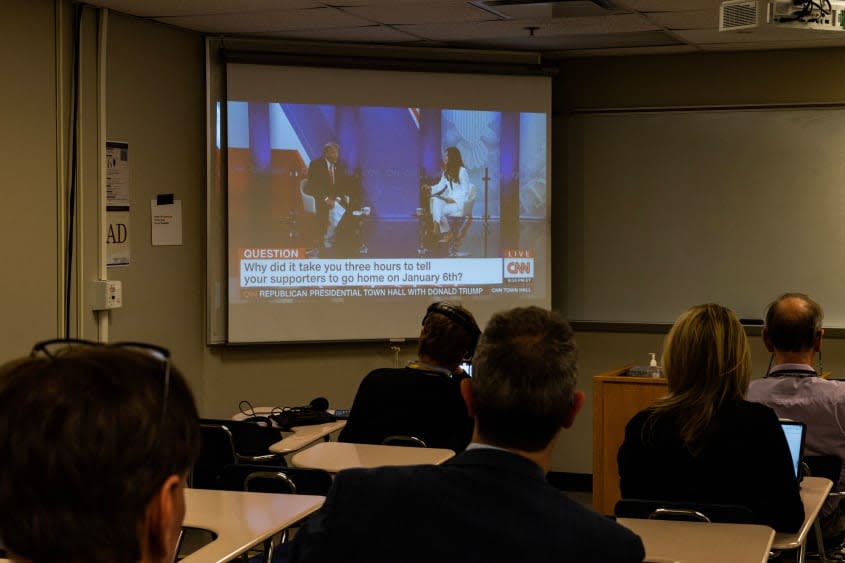How do you interview Donald Trump, anyway?

- Oops!Something went wrong.Please try again later.
To hear CNN chief Chris Licht tell it, the American public was "served very well" by his network's recent "town hall" event with former President Donald Trump. Acknowledging that "you do not have to like the former president's answers" in a message to CNN staffers reportedly outraged over the broadcast, Licht justified the interview by noting that CNN host Kaitlan Collins "pressed [Trump] again and again and made news. Made a LOT of news."
"That," he said, "is our job."
Licht's strident defense of the interview comes amid a barrage of criticism over the content of the broadcast and his network's culpability in helping disseminate the former president's repeatedly debunked lies. But in justifying his programming decision, Licht also raises — perhaps inadvertently — a broader question beyond simply the content of one town hall; by invoking the justification of having "made news" as being his journalists' "job," some critics contend, he has muddled a distinction between medium and message, and ultimately failed to deliver on the presumptive promise inherent in a high profile interview of a former president and current presidential front runner.
This, in turn, invites the inevitable follow-up dilemma: how should the news report on someone who has perfected the rhetorical art of the "Gish gallop"? How can journalists effectively sift through and contextualize comments from someone who chooses to overwhelm their interviewer, audience, or debate opponent with an uncheckable deluge of only tangentially relevant and incorrect arguments? While hardly a new dilemma, the looming 2024 presidential election has injected a new sense of urgency into an old, and still unanswered question: how do you interview Donald Trump, anyway?
The format matters
"The best case scenario — in which Trump's lies/crimes/authoritarianism are meaningfully confronted and exposed — was never possible in the town hall format," HuffPost editor and extremism expert Andy Campbell tweeted in response to a report that the largely sympathetic audience at CNN's event was largely the product of invitations made by local conservative groups.
Despite Collins' efforts to push back on a handful of Trump's lies, "the problem was in that format it was a rally, it wasn't a town hall," agreed MSNBC's Willie Geist.
Given the format of CNN's town hall, "the only way Collins really could have even semi-succeeded would have been if she had ignored the audience and the format entirely and instead tried to pin Trump down on each and every one of his false and offensive statements," concurred MSNBC's Medhi Hasan. The problem, then, was that within that format "the CNN anchor didn't — couldn't! — do that."
Giving a politician free reign to capitalize on a network's hard-established measure of trust with an audience live, and without recourse, "is really not a transaction news organizations should be making anymore, particularly with this candidate," Hofstra University Communications School Dean Mark Lukasiewicz told PBS.
In fact, other formats have already proven themselves to be particularly — if intermittently — effective when it comes to covering Trump, contrary to the "strange amnesia about the ethical and professional interviews conducted with Donald Trump over the last few years" that's arisen, according to University of Maine communications professor Michael Socolow. Pointing out Trump's 2020 Fox News interview with Chris Wallace, his 60 Minutes sit down with Lesley Stahl that same year, and the massively viral one-on-one with Axios' Jonathan Swan, the common denominator seems to be that "they were all taped on video for later broadcast." Accordingly, Socolow concludes, "news media shouldn't turn over their live microphones and airwaves to [Trump], but, rather, interview him while allowing his team to bring any video production tech he feels he needs to protect himself.
"It's time to ask him some new questions"
For as much as the medium might be the message when it comes to interviewing Trump, the content of the interview itself is what's important at the end of the day. To that point, a number of commentators have zeroed in on the specific questions being asked as the make-or-break factor in a successful Trump interview. Since "getting into the weeds of factual disputes with Trump, even when he is provably wrong, is not a fruitful way to question him," Washington Post columnist Ramesh Ponnuru posited recently. "It's time to ask him some new questions."
But simply asking new questions, no matter how aggressively pointed they might be, still affords Trump the opportunity to give an "acid trip of an answer," as journalist Simon Hattenstone wrote in 2017. To that end, Hattenstone recommended asking questions that are "simple" and "unambiguous" while predicting that "over the next few years, in the so-called 'post-truth; age, interviewing may become harder and harder."
Moreover, it's not just offering pointed questions, but having the patience to demand an answer that matters. "You let him speak until it's clear he won't answer and then you ask again," journalist Hamilton Nolan suggested after Trump's town hall. "Cut off his mic, if necessary. He won't like that. Doesn't matter. Ask the clear question again. When he doesn't give a clear answer, ask it again. The same question. Ask it again. Ask it again. Ask it again. Ask it again."
"It has never been done to the best of my knowledge," he noted. "It can be, though."
Even if the questions aren't answered in the specific, the process itself can produce an important outcome in which "you may not be able to stop the [then-]president lying, but you can stop him looking authoritative," Financial Times columnist Henry Mance wrote in 2020. For a politician whose entire career seems predicated more on assertive impressions of competence rather than enumerated policy specifics, that may just be the most important takeaway an interviewer can provide.
You may also like
Pilots at United picket for wages as other airlines threaten to strike
How do you interview Donald Trump, anyway?
North Carolina State concludes tragic school year that saw 14 student deaths

